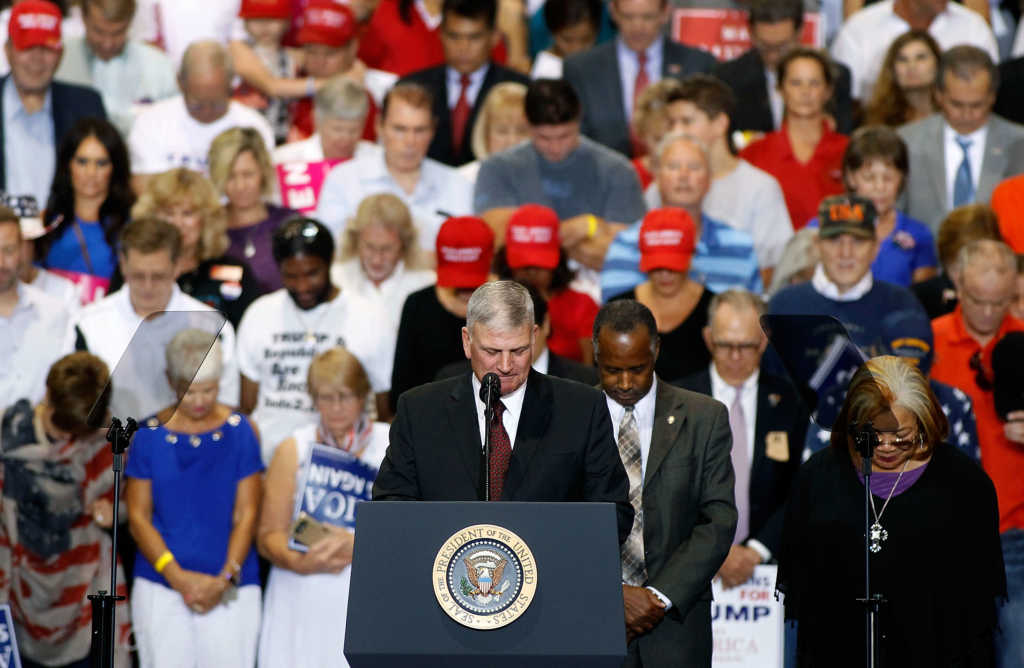Around 50 evangelical leaders met this week at Wheaton College, Illinois to discuss the future of evangelicalism in light of the Trump presidency.
While they later insisted it wasn’t an anti-Trump gathering, many attending the meeting have voiced concerns regarding the evangelical movement and the direction it is headed during the Trump-era.
Doug Birdsall organized the event. He is an honorary chair of Lausanne, which is an international evangelical group that unites Christians from all over the world. The group includes pastors such as Tim Keller and A.R. Bernard and also has leaders of major ministries, denominations, colleges, and seminaries.
Trump was the “elephant in the room,” Birdsall said, because of the way the term “evangelical” has been treated under his administration. He argued that many Americans see evangelicals as a joke because of the way it has been linked to nationalist and racist movements in the United States over the past couple of years.
Furthermore, the Wheaton group stated they are not trying to launch a counter political movement against some evangelical leaders, like Liberty University President Jerry Falwell, who often praises the President. They said they are only trying to bring it back to its origins.
“When you Google evangelicals, you get Trump,” Birdsall said. “When people say ‘what does it mean to be an evangelical’, people don’t say evangelism or the gospel. There’s a grotesque caricature of what it means to be an evangelical.”
Some of the attendees might even like some of the President’s policies, but they still want the term “evangelical” to return to its original meaning: a person who believes in the authority of the Bible, salvation through Jesus’ work on the cross, personal conversion and the need for evangelism.
“We need to be wiser and better in the way we do ministry,” Keller said, founding pastor of Redeemer Presbyterian Church in New York. “Faith and God and sin and grace and idolatry are about fundamental human reality, and everything else is a way of dealing with those issues. It is a complete terrible reversal when [people believe] religion is about politics when it’s the other way around.”
“No matter what happens to American evangelicalism, it is here to stay. It’s international, global and politically diverse,” he said.
It is not new for evangelicals to be involved with politics. During the Obama administration, evangelicals were also worried about the future of Christianity in America, but for different reasons than they are now. They feared what would happen to Christian institutions because of their positions against hiring gay professors, for example. Or they fought against medical care that required them to pay for things they stand against, like abortions.
In 2012, Wheaton College sued the federal government over an Obamacare mandate that forced them to cover “week-after” abortions in its healthcare plan because it went directly against their beliefs.
Since the administration change, Keller stated that many evangelicals feel isolated and exiled from the Christian community if they support a looser immigration policy or foreign policy.
One member of the group even went far enough to say that white evangelical Trump supporters have jeopardized the reputation of American Christianity. A.R. Bernard is a black pastor of a 40,000-member church in Brooklyn, New York. He was on the advisory board of evangelicals for Trump but resigned last year after the protests and violence Charlottesville, Virginia. He cited Trump blaming “both sides” for his reasoning for leaving.
“They continue to squander their moral authority in an attempt to sanitize the president,” said Bernard.
“This presidency has exposed the spiritual, moral and racial condition of this nation,” he said. “The racial divides go deep in this country, and they’ve invaded the church.”
Some attending the Wheaton gathering have expressed irritation at evangelical leaders who constantly praise Trump including evangelist Franklin Graham, Liberty University president Jerry Falwell Jr. and Texas megachurch pastor Robert Jeffress. It makes it seem like they speak for all evangelicals when so many feel the opposite.
World Relief Vice President Jenny Yang is co-chairing the Wheaton meeting alongside Bishop Claude Alexander, a black pastor from Charlotte, North Carolina.
“When a lot of folks think about evangelicals they think of people who are tied to the administration, but they don’t represent the evangelical community,” said Jenny Yang.
Yang says she expects conversation regarding major events that have transpired over the past year including the #MeToo movement, white supremacy in the United States, and refugee and immigration policies. The group invited six leaders from around the world to the meeting in order to see how other countries perceive the United States on a global stage.
Since the 1980’s when the Moral Majority movement took place, evangelicals have become increasingly involved with politics. During the last election, 26 percent of the electorate was white evangelicals, 80 percent of which voted for Trump.
A.R. Birdsall claims that the greatest barrier to the spread of the gospel is how evangelicals are embracing “trumpism.”
Scathing Babylon Bee Post Takes Aim at Progressives & White Privilege
“We realize millennials are disaffected and global evangelical leaders are disillusioned,” Birdsall said. Using his daughter as an example, he says she believes that people only see evangelicals as racists.
Rich Mouw, former president of Fuller Seminary, stated that evangelicals are having to address the crisis within the movement itself.
“There’s a real pastoral problem right now that in any given congregation that it’s a topic you can’t talk about,” Mouw said. “I don’t think it’s fear. I think it’s genuine pastoral perplexity about how we deal with this.”
Mark Labberton of Fuller Seminary, Ed Stetzer of Wheaton College, Jo Anne Lyon of the Wesleyan Church, Harold Smith of Christianity Today and Gabriel Salguero of the National Latino Evangelical Coalition are also in attendance this week.
Yesterday, Tim Keller was the guest speaker at Wheaton’s Chapel. He spoke on Mark 15:42-47, encouraging students to use the “transforming power of the Gospel to simultaneously humble and embolden Christians.”
You can watch the full video below:



